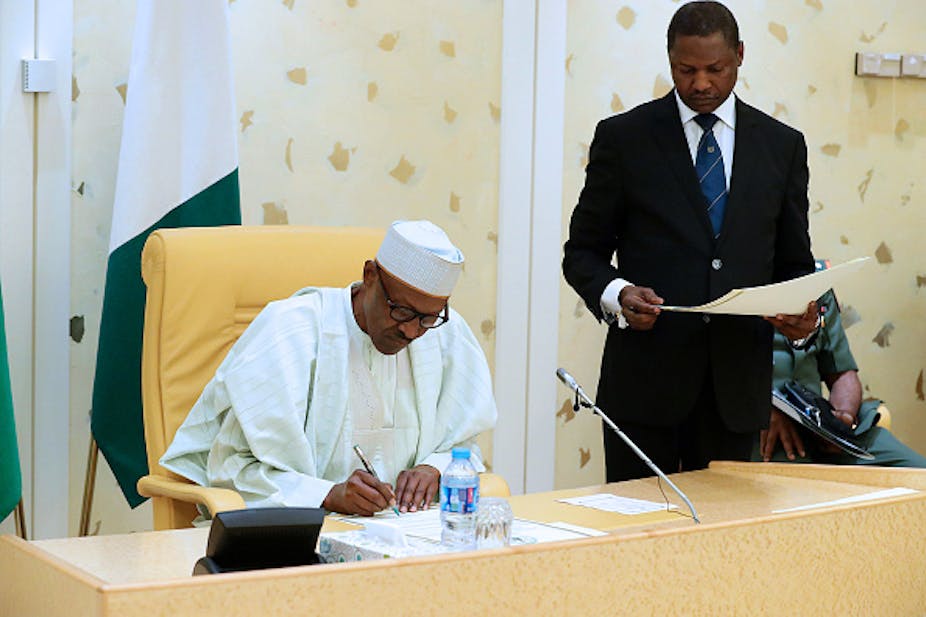The Nigerian government recently threatened to declare a state of emergency in Anambra, a state in the south-east of the country, because of rising insecurity. This generated heated debate about the legitimacy of declaring a state of emergency. The Conversation Africa’s Ogechi Ekeanyanwu asked political science lecturer Uchenna Simeon to explain the circumstances under which a state of emergency can be declared.
What are the criteria for declaring a state of emergency?
The conditions are set out in Nigeria’s 1999 constitution. A state of emergency can be declared when:
Nigeria is at war
-
the country is in imminent danger of invasion or involvement in a state of war
there is a breakdown of public order and public safety in any part of the country
there is a clear and present danger of an actual breakdown of public order and public safety
there is an occurrence or imminent danger of the occurrence of any disaster or natural calamity
there is any danger which clearly constitutes a threat to the existence of Nigeria
The last is when the president receives a request to declare a state of emergency from a state governor. The president can also make the decision in a situation in which the governor of the state fails within a reasonable time to make a request.
The constitutional powers to declare a state of emergency rests with the president. The president has the power to proclaim a state of emergency in any part of Nigeria by publishing the order in the official government gazette. The proclamation must be ratified by the National Assembly made up of the Senate and House of Representatives.
A resolution must also be passed by two-thirds of the members of both houses.
Does the situation in Anambra State warrant such a declaration?
No. The security challenges in Anambra State over the past weeks do not in any way qualify for the proclamation of a state of emergency. The isolated cases of arson, killings and destruction of public and private properties do not threaten the survival or national security of Nigeria.
Nigeria ratified the Siracusa Principles. This is an internationally recognised set of rules which set out limits to restrictions on rights during emergencies. One of the general principles is that any decision about an emergency must be done in good faith. It must also be done on the basis of an objective assessment of the situation.
The principles state:
National security cannot be invoked as a reason for imposing limitations to prevent merely local or relatively isolated threats to law and order.
The situation in Anambra State can be described as “merely local or relatively isolated threats to law and order”.
What additional powers does a state of emergency give to the government?
Normally, the official gazette will specify the extent and scope of the emergency powers. The following additional powers can be exercised under emergency rule:
massive deployment of the armed forces to take charge of security in place of the policy
invasion of people’s privacy (including homes and offices). Searches can be conducted without a warrant
suspects can be arrested and detained without being charged
special laws can be enacted to punish those who flout the emergency rules
quasi-judicial bodies can be set up to try offenders
rights to lawful assembly and freedom of expression and communication can be restricted
the Nigerian government can decide to take over the executive and legislative functions of the affected state
destruction and confiscation of private property without compensation to the victims
restrictions on the conduct of private businesses including financial transactions.
Under emergency rule, the government enjoys wide powers which infringe on human rights and fundamental freedoms. The Siracusa Principles limit which rights can be infringed. During the enforcement of emergency rule, however, these principles might not be adhered to.
What are the dangers of declaring a state of emergency?
The government can abuse the emergency powers. In fact, dictators around the world abuse emergency rule. They impose restrictions on people’s rights and freedoms.
It can also lead to temporary suspension of the democratic order and pave the way for the ascendancy of anti-democratic forces. Nigeria runs a federal system – a situation where the federating units are expected to enjoy autonomy. But the country’s federal system is deeply flawed with power and resources inordinately in control of the central government.
In this situation, a state of emergency can deepen the unitary structure. The federal government can use the power at its disposal to encroach on the powers vested in the states by the Nigerian constitution. The possibility of federal government taking over the affairs of the state explains why no state governor has ever requested the president to proclaim a state of emergency in their state.
So what should happen?
A state of emergency is not an aberration. It is a normal political instrument that can be used under extraordinary circumstances that threaten the survival and national security of Nigeria. It is, however, subject to abuse. This is particularly true in Nigeria where the role of the legislature and judiciary are constantly undermined and influenced by the executive.
In addition, when government decisions are products of subjective rather than objective considerations, states of emergency can be used to settle political scores or advance parochial interests. This is the case in Nigeria quite often.
Lastly, a state of emergency can be abused unless both the legislature and judiciary can assert their independence in practice, and rule of law is made the cardinal principle of governance.

